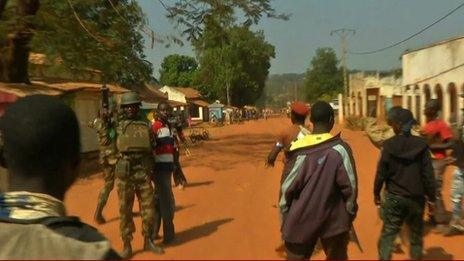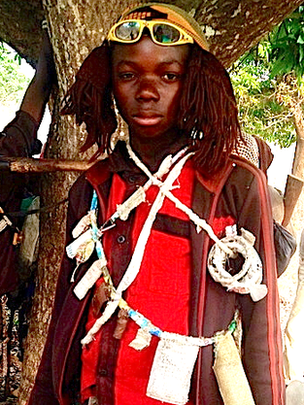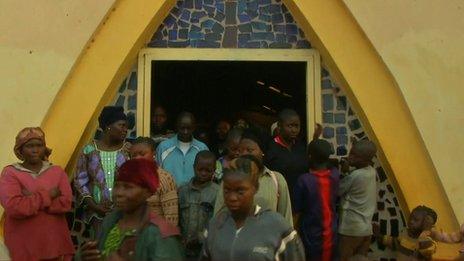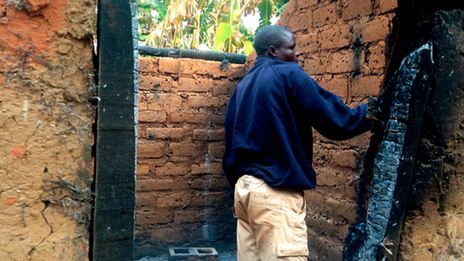Central African Republic lynch mob seeks sectarian revenge
- Published
BBC's Thomas Fessy: "Only a gun makes a difference in front of a Lynch mob"
As sectarian violence continues in the Central African Republic, the BBC's Thomas Fessy writes of his encounter with a lynch mob in the north-western town of Bozoum.
"Kill him. We must kill him," young men are shouting, brandishing machetes and knives.
These angry men are militiamen, calling themselves "anti-balaka". They took up arms, they say, to defend the Christian population.
But they have now turned into lynch mobs.
They have just found their prey - a Muslim man, whom they accuse of having fought with the Seleka forces who seized power last year.
Covered in amulets and talismans, which they believe will make them invincible, they all want to have a go at him.
Blood is trailing from the back of his head already, as he keeps being shoved.
"Seleka killed our families like animals, we have to kill him," one of the militiaman says.
Another one runs closer and whips him. After several failed attempts, he manages to escape, but he is quickly cornered again in a side street in the town of Bozoum, 400km (250 miles) north-west of the capital, Bangui.
Warning shots
"We have suffered terribly but I can't accept that we should kill as a result," a woman comes to tell us.
"They should hand him over to Misca [the African Union peacekeeping mission] instead."
Two Cameroonian soldiers force their way through the scrum, automatic rifles forward.

An African Union soldier defends a Muslim man from Christian militiamen
The man is finally extracted; the peacekeepers are dragging him toward their base down the road.
Dozens of militiamen are following them at a steady pace, some protest, shouting that they shouldn't be prevented from what they "have to do."
The anger is rising and the peacekeepers are almost encircled. One of them has no other choice, he pulls the trigger pointing toward the sky.
Only the gun makes a difference in front of these lynch mobs. It will take another burst of warning shots to keep the anti-balaka at a safe distance.
"If you cross this line, we will shoot you," the AU team leader screams, leaving a horizontal trace with his foot on the dirt road.
There are 11 AU soldiers here. They have prevented a man from being killed - but can they save the next one?
Unleashed to kill

There are hundreds of children fighting for the anti-balaka
Men with machetes strapped to their trousers or wearing belts of ammunitions for their homemade guns are all over the town, we bump into them every few metres.
Seleka forces left the town of Bozoum on Monday. Since then, the anti-balaka keep pouring out of the forest.
They are on the hunt, unleashed to kill and seeking "revenge".
On Wednesday night, some of them attacked the house of imam Ahmad Mohamed.
We had heard a volley of gunfire.
As we meet the imam at his house the morning after, he explains that his quick call to the AU soldiers saved him and his family.
"In 40 years here, I have never seen that," he says.
"But the violence is out of control, we don't have a choice, we must leave or get killed."
'We live in fear'
More than 1,000 Muslims were evacuated this week. Those, like imam Mohamed, who had thought they could stay, now say there is no more alternative.
They are waiting for a military convoy - organised by the Chadian army most likely - to come and escort them all the way to Chad.

A fearful countdown has started.
Perched on a hill, the Catholic mission is holding a last church service for the displaced people it has hosted since early December.
Time seems up for some, but for the displaced Christians, the departure of the Seleka forces may allow them safe passage back to their neighbourhoods.
Many have lost relatives, and the church became their only sanctuary.
"We've had enough, we want to go home," says Martien Yeremanda as he starts walking down the hill, a wooden bench with pots and basins on it swaying on his head.

Displaced families have taken refuge from religious violence at a church
His brother was hit in his chest by a poisoned arrow and died during the violence last month.
"An international force must come to protect us because we live in fear."
The 3,500 Christian people who had chosen to camp out by the church returned home on Thursday, but they were not sure of what they would find.
On the roads north and south of Bozoum, villagers have nowhere to return; they are still hiding in the forest.
We immediately understood why as we drove outside the town.
We saw the signs of the brutality they have faced: Every single house on either side of the road has been burned down.
An estimated 1,300 homes were torched in two days last week, hours before the former Seleka's Michel Djotodia stepped down as interim president.
Jerome Ngaina is returning to his village, Bokongo, for the first time.
A group of anti-balaka militiamen - the only ones to venture around here - give him the local greeting; they gently touch foreheads together, and pat his head.
Mr Ngaina worked at the parish before he was captured last week, beaten and held for three days, deprived of water and food.
Like in all others in the village, there is nothing left in his house but cold ashes.

Jerome Ngaina returns to his burnt-out house in Bokongo village
The man who negotiated his release is an Italian priest, Father Aurelio Gazzera.
After 22 years in this country, he has seen rebellions and coups, but he is now dealing with unprecedented sectarian violence.
He is extremely worried that the worst may still happen.
"It is possible to avoid it but it will be more and more difficult, and the margins are getting very narrow," he says.
"Especially now that the former Seleka forces have left, it was clear that we were going to need a deployment of military forces to protect both communities, avoid the looting and attacks of anti-balaka fighters, and quickly disarm them all."
Vigilantes
Without a stronger international force around, he may be the last chance of mediation between the communities here.
He's been driving around kilometres of land outside Bozoum to meet hundreds of anti-balaka fighters.
He addresses them fluently in the local language, Sango.
When he convinced the Chadians and the AU force to force the Seleka combatants out of Bozoum earlier this week, his car was stoned and he was nearly killed by Muslim civilians who were scared that they would lose protection.
Other Muslims praise his courageous attempt to ease inter-communal tensions, and it was a Muslim man who saved him.
On the road back to Bozoum, a group of anti-balaka comes out of the bush to stop our car.
They have become Christian vigilantes and they are determined.
Father Aurelio talks to them under an imposing mango tree.
A few meters away from him though, these fighters speak their mind more freely.
Flanked by two other fighters wearing rice bags for masks, a militiaman warns the Muslims.
"If they don't leave, we will continue fighting and we will chase them," he tells me.